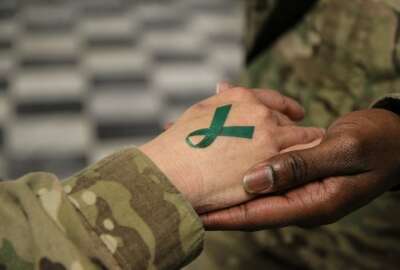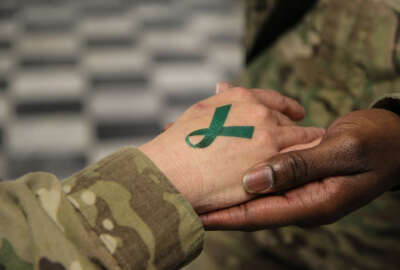Report finds military services still ill-equipped to investigate, prosecute sex crimes
The DoD inspector general found serious shortfalls in numbers of prosecutors and investigators trained to handle military sexual assault cases.
It’s been nearly a decade since Congress first told the military services to set up special victims units to investigate and prosecute crimes such as sexual assault, domestic violence and child abuse. Although the new units are up and running, an audit released Wednesday shows the actual results within the military services are drastically short of what lawmakers had in mind.
In particular, the DoD Inspector General found a dramatic shortfall in prosecutors who are trained to handle crimes like sexual assault. Each military service now has programs to train prosecutors in special victim cases, but there aren’t nearly enough of them.
From 2018 to 2020, only the Marine Corps involved specially-trained prosecutors in a majority of its special victims (SVIP) cases, based on a sample of 447 prosecutions the IG examined across the military services.
Although the Marines assigned those specialists to 89% of its cases, each of the other services did far worse. In the Army, only half of the victims had specialized prosecutors assigned to lead their cases. The Navy assigned those specialists to just 41%, and the Air Force only had enough for 6% of its cases — 7 out of a total of 107 in the sample.
The IG found the shortages are likely connected with a significant increase in “unrestricted” sexual assault reports — those in which victims are willing report the crime to their commands and law enforcement. Over the past decade, the number of those reports roughly doubled. But in the Air Force’s case, the number of trained prosecutors only increased by 5% over the same period.
And Wednesday’s report found other reasons that relatively fewer military legal professionals would have been available to specialize in special victims cases, even if the services had budgeted and planned for large numbers of additional prosecutors.
“First, the service legal communities had other mandatory responsibilities (such as defense counsel and victim’s legal counsel programs) that limited their ability to reassign personnel to the SVIP capability,” auditors wrote. “Also, based on career progression models, we concluded that many experienced litigators were assigned to supervisory positions and did not work directly with SVIP teams. This limited the services, which did not have a sufficient number of experienced judge advocates to certify as SVIP prosecutors.”
And in difficult-to-prosecute sexual assault cases, experience is crucial, the IG noted — a fact that’s also been acknowledged in DoD policy. Starting with a 2014 directive, the Pentagon mandated that its special victims prosecutors be “experienced” judge advocates.
According to the report, the military services tended to preserve the relatively few SVIP prosecutors they had in their ranks for cases that were most likely to end in a court-martial, or especially complex ones. But that prioritization failed to answer Congress’s original intent, which was to increase specialization for all special victims cases, starting with the initial phases of an investigation.
And the IG found the shortfall in specialized prosecutors hampered those early stages too.
“During many of the investigations we reviewed, the assigned prosecutor was an inexperienced, junior prosecutor without specialized training in special victim cases,” auditors wrote. “The investigative phase of a case may include critical decisions, such as whether to seek a search authorization and the prosecutor’s opinion as to whether probable cause exists to support charges. A discussion about protective orders could benefit commanders, victims, and victim advocates. Failure to assign specially trained and certified prosecutors during the initial phase of a case increased the risk that investigators and commanders may not have received the best legal advice with respect to critical investigative steps and case adjudication decisions.”
Rep. Jackie Speier (D-Calif.), who chairs the House Armed Services Committee’s subcommittee on personnel, called the findings “damning,” and said they provided evidence that the Defense Department still is not allocating nearly enough resources toward the problem of sexual assault.
“These are the same failures that set back the investigation into Specialist Vanessa Guillén’s murder and so many other violent offenses.” Speier said in a statement. “I expect to see significant funding increases for investigators, digital forensics examiners, and information systems to increase efficiency and improve compliance with the law and the Defense Department’s own policies. Survivors have waited far too long for investigative resources commensurate to these terrible crimes.”
The IG findings, however, were not all negative. Auditors noted, for example, that each of the military services have successfully implemented policies that assign sexual assault response coordinators and victim advocates whenever a new case is reported. Of the 227 cases the IG examined, each one had certified coordinators and advocates assigned to help victims.
“This occurred because the services established multi-layered approval, review, and program inspections to manage victim advocate applications, renewals, and verification milestones,” according to the report. “In addition, the DoD Sexual Assault Prevention and Response Office disseminated weekly certification status rosters to enable program managers to reduce any lapses in certification. Collectively, these measures ensured that only certified SARCs or SAPR VAs were assigned to cases of covered offenses.”
But in addition to a lack of prosecutorial resources and expertise, the report also found similar shortcomings amongst the cadre of military criminal investigators who are assigned to perform initial investigations into sexual assault allegations.
DoD policy requires that specially-trained and certified investigators be assigned as the “lead” investigator anytime there’s an allegation of sexual assault, and each military department has established their own requirements and certification programs to match that policy.
Nonetheless, during the same 2018-2020 time period, auditors also found that non-certified agents were assigned to lead those investigations in 26% of all cases. The results varied by military service.
Within the Army’s Criminal Investigation Command, 9% of those investigations were led by agents who hadn’t been properly certified. For the Naval Criminal Investigative Service, the figure was 16%. It was highest in the Air Force, where 66% of the Office of Special Investigation’s cases were led by non-certified investigators.
“OSI has seen a significant increase in abusive sexual contact, sexual assault, and domestic violence cases due to the changes implemented by Congress over the past eight years regarding jurisdiction over these offenses. However, we have not had a corresponding increase in resources and manpower to address the additional workload,” an unidentified Air Force law enforcement official told the inspector general. “With only 21 specialized billets and not all field agents being SVIP trained, this presents a significant challenge for the command.”
Copyright © 2024 Federal News Network. All rights reserved. This website is not intended for users located within the European Economic Area.
Jared Serbu is deputy editor of Federal News Network and reports on the Defense Department’s contracting, legislative, workforce and IT issues.
Follow @jserbuWFED







